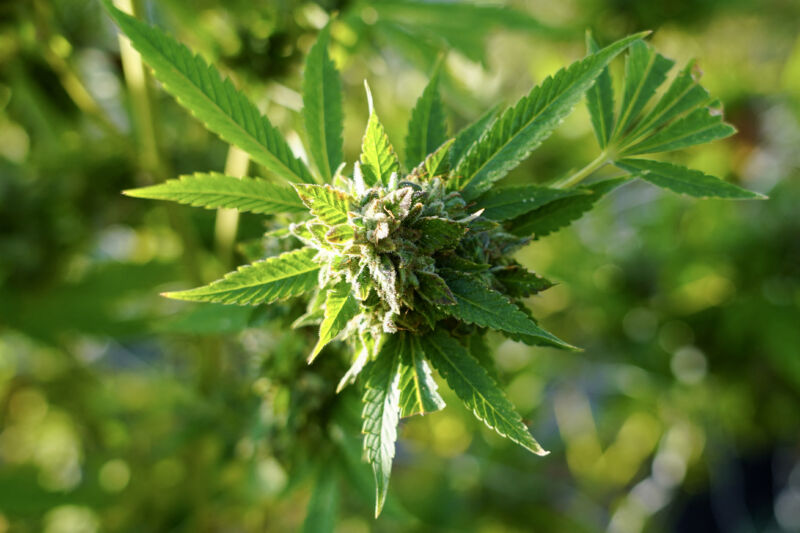
Survey data collected from more than 430,000 US adults over multiple years suggests a strong, statistically significant link between the use of cannabis and an increased risk of cardiovascular disease, specifically heart attack and stroke.
The open-access study, published this week in Journal of the American Heart Association, found that people who used cannabis every day had 25 percent higher odds of having a heart attack and 42 percent higher odds of having a stroke compared with those who did not use cannabis at all.
But, the national survey data—collected between 2016 and 2020—also contained data on people who used cannabis less frequently than daily. Survey respondents were asked how many days in the past 30 days they used cannabis, which allowed researchers to estimate the odds of cardiovascular disease along the whole spectrum of cannabis use. And they found near-linear dose-responses, with more days of use per month associated with higher risk.
This isn’t the first time that researchers have found an association between cannabis use and cardiovascular disease, but the study is among the largest to date—with a sample size between three and 17 times larger than previous studies. Its size not only added weight to the link but also allowed the researchers to drill down into other risk factors for cardiovascular disease.
Clear link
One common complicating factor is that people who use cannabis also often use tobacco products, which carry their own increased risk for cardiovascular disease. In the new study, led by Abra Jeffers of Massachusetts General Hospital, researchers were able to do two additional analyses: one that looked at cardiovascular disease risk in people who use cannabis but had never used tobacco products and a second one that looked at people who used cannabis but had never used tobacco products or e-cigarettes. Without tobacco use, the higher odds of heart attack and stroke persisted for people who used cannabis. For those without tobacco or e-cigarette use, only the higher odds of stroke remained.
The researchers also looked at age, another complicating factor. Heart disease can take years or decades to develop, but people who use cannabis tend to skew younger. The 434,104 people who took the survey ranged from age 18 to 74, and the analyses adjusted for other health factors, including alcohol use, diabetes, body mass index, and physical activity. When the researchers looked at just the adults who would be considered on the young side for developing cardiovascular disease (less than 55 for men and less than 65 for women), they found that cannabis use also increased the odds of premature cardiovascular disease—and again the link was independent of tobacco and e-cigarette use.
In all, the researchers concluded that “These data suggest that cannabis use may be a risk factor for cardiovascular disease and may be a risk factor for premature cardiovascular disease,” they wrote. This is particularly concerning, they add, because of the growing acceptance and use of cannabis in the US and a decline in perceived health risks.
Limitations
But, the study has limitations that preclude a firm conclusion that cannabis is causing cardiovascular disease. The study relies on self-reported data on both cardiovascular health and cannabis use—both of which can be unreliable. It also relied on data collected at a specific point in time. It’s possible that some people turned to cannabis use after developing cardiovascular disease rather than before, for instance. The survey data can’t make that distinction; it’s only making an association. The authors note that cardiovascular disease, heart attack, and stroke have not previously been identified as major reasons that people use cannabis. This lessens the reverse concern that cardiovascular disease is increasing the odds of cannabis use. But, the researchers do note that many studies have linked the use of cannabis to chronic pain, insomnia, and anxiety—all of which have also been associated with cardiovascular disease. Last, the survey data does not include data on people’s actual cardiovascular health, such as blood pressure and lipid profiles.
Another wrinkle to the study is the route of cannabis use and how it may play a role in the link to cardiovascular disease. About 74 percent of cannabis users in the study reported smoking cannabis, which could potentially increase the risk of cardiovascular disease much the same way as tobacco cigarettes—a result of inhaling particulate matter into the lungs. It’s unclear if edible cannabis products would weaken the association seen in the study.
But, the authors note that there is a biologically plausible link between cannabis and cardiovascular disease. Cell signaling receptors that detect components of cannabis (endocannabinoid receptors) are ubiquitous throughout the cardiovascular system, the researchers note. And the key psychoactive substance in cannabis, Tetrahydrocannabinol (THC), can increase blood pressure and heart rate during use.

